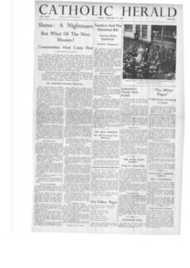Page 14, 14th February 1936
Page 14

Report an error
Noticed an error on this page?If you've noticed an error in this article please click here to report it.
Tags
Share
Related articles
London School Theatre To Be Founded Classics And Best...
I Ariel Flew To The
Not Black And White On Blacks And Whites
Staging The Drama Of Faith
Films By Freda Bruce Lockhart
BRINGING-UP AN AUDIENCE School Theatre Experiment
Seats-2s. To The Rich, 2d. To
The Poor
ideas Men are rare, but I met one the other day. He was Dr. Oskar Ebelsbacher, and his idea is to start a school for audiences, instead of a school for actors.
Under the name of the English School Theatre, he intends to produce matinees all over the country for child audiences. Very widespread interest is being taken in the movement, Sir Philip Ben Greet has agreed to become the first president, and the L.C.C. have welcomed its initial suggestions.
Since he has been in England, Dr. Ebelsbacher has discovered how many children, who never dream of missing their weekly film, have never even seen a play—nor under ordinary conditions are ever likely to see one.
Plays Specially Produced For The Child
I don't know whether Herr Ebelsbacher is more concerned with the fate of the uneducated children or with the fate of the drama, but in any case he is determined to make a change, which if his plans materialise should be in the nature of a revolution in the theatrical world.
When funds allow, the school theatre will establish itself for the producing of plays of a certain cultural standing in such a way that they will be understood by a child audience. Herr Ebelsbacher does not intend his repertory to be entirely classical—though such writers as Shakespeare will naturally be given precedence—for in appreciating the theatre it is as necessary to know Sheriff as it is to know Sheridan or Shaw,
Permanent Theatre Unnecessary
At this point of Herr Ebelsbacher's explanations, poured out upon me in a flood of enthusiasm, I got a little involved, so I had to check the flow and ask for help in my difficulties. " Does this mean," I enquired, " that you intend to build your theatre and start producing directly it is ready?" Herr Ebelsbacher saw me floating downstream in quite the opposite direction from his ideas. He caug:.t me up and brought me back with a jerk. " It is not at all my idea to build a theatre, ever," he said. " We have nothing to wait for, and shall begin producing at once as soon as we have the funds."
The play, so this enterprising director explained, would appear on a West End stage on the afternoon when the theatre is not being used for matinees. First-class productions would be guaranteed, since scenic effects and lighting would be all to hand.
In such a way, too, it made cheap
tickets possible. Theatres are not expensive to hire in the afternoon and therefore the prices for seats would range from is. 10d. to 10d.—with a certain percentage of free or 2d. seats for L.C.C. schoolchildre,i.
Programmes giving explanations and synopsis of the plot would be distributed to each child.
All-Star Casts
Herr Ebelsbacher expressed hope that it would be possible to have several companies, some to operate in London and others in the provinces. As far as is in his power, he would like to have his productions staged near schools to facilitate arrangements with teachers, but he was very insistent that the plays should only appear on proper stages, since no justice could be done to a work if makeshift stageing is used. " The schools should come to me--not I go to the schools."
His standards, too, are high, only the best is good enough for the child, and therefore, as necessary as the choice of a good play. is the choice of a good cast. Dr. Ebelsbacher fully intends to employ first-class actors and actresses, and to pay them according to Equity regulations.
Actors who will take part in these productions should beware—theirs is the task of creating the taste of their future audiences.
A Young Idea
As yet, the idea is very much in its infancy—a sturdy child it certainly is, hut without enough vigour to make itself felt.
Its offices, at 43, Westminster Bridge Road, S.E.1, are not easy to find. The outer door has no indicating plate and the telephone number is neither in the directory nor do the operators seem to be able to trace it.
I asked Herr Ebelsbacher when he intended to remove himself on to the more accessible bank of the river, and he smiled a little and said that although his little office was not completely convenient it is, by ete way, shared with an electrical contractor who adorns the shelves with neon and other lighted signs—it was not altogethcr inappropriate.
When the theatre was still young, the medieva! City of London authorities would not hear of plays being produced within its boundaries. Hence theatres only existed on the south side of the river, and the new English School Theatre is in keeping with tradition insofar as its cradle is Southwark—the cradle of early English drama.
[It has been pointed out to us that the names of certain signatories of the English School Theatre appeal in The Times and elsewhere are actively connected with such organisations as the Society for Cultural Relations with the U.S.S.R. We do not regard this as sufficient reason for suspecting the directors of the English School Theatre of intending to use it for irreligious or other subversive propaganda. Nor do we associate such propaganda with the names of Sir Philip Ben Greet (president of the school theatre), or of Sir Ernest Benn, Lord Bessborough, Mr. St. John Ervine, Mr. A. A. Milne and others who signed the appeal in the press.—Ebrr0a.1
blog comments powered by Disqus

















